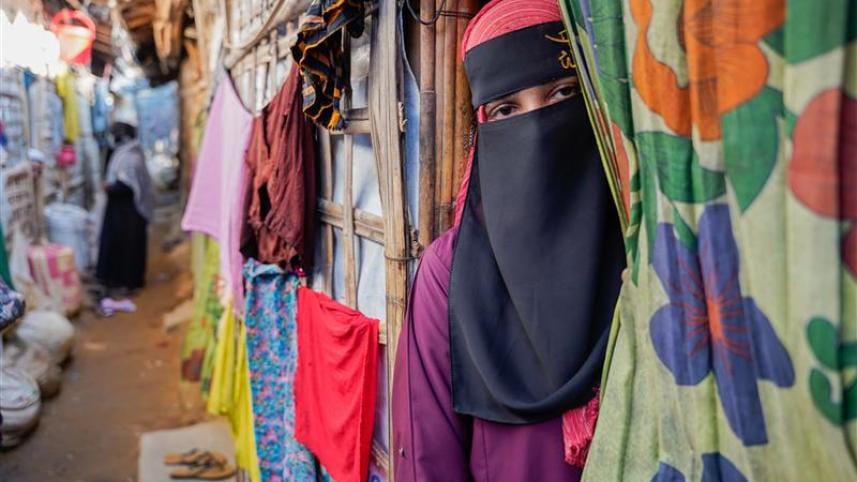Rohingya crisis: Refugees without a country, a world without excuse

Bangladesh cannot carry this weight alone. Hosting over one million Rohingya refugees is not a bilateral matter. It is a regional crisis and a global issue.
This is a tragedy Bangladesh did not invite. Families fled to save their lives, crossing forests, rivers, and rough roads. Days passed without food. Children sobbed until their voices faded. Mothers gave the last drops of water to their babies. The pain of hunger became a dull, constant ache. Yet they kept walking, because they knew turning back meant death.
They did not become refugees by choice. Their villages were burned, women and girls were raped, and men were tortured and killed. Generation-old homes were erased. This brutal reality is something I have listened to in the voices of Rohingya people—young and old, women and adolescent girls speaking in Cox's Bazar and on different international platforms. Their stories are heart-wrenching. Each has lost a loved one. Each carries invisible scars.
I remember a young Rohingya man in the camps once asking, "Where do I belong? In Rakhine, they say I do not belong there. Here, I am only a refugee. Why am I stateless? I wanted to be a computer engineer. Now I survive as a volunteer. I want to thrive." This struggle echoes among thousands, struggling to cope with grief and helplessness in the nooks and alleys of the camps in Cox's Bazar.
This sense of helplessness has only deepened over time. Eight years have passed, and the population has grown to over a million. Since January 2024 alone, 150,000 more have arrived, living in camps with the bare minimum. Space is shrinking and resources are stretched, yet many remain unregistered. Amidst this, the Rohingya people are not allowed to work, and children and youth have no access to formal education. Their potential remains locked away.
In the face of this locked potential, experts speak of "self-reliance," but what does that mean without a real plan? Bangladesh cannot shoulder this alone. Donors, the United Nations, the international community, and regional leaders must design and finance a model that benefits both the displaced Rohingya population and host communities.
While such a model is crucial for survival, the ultimate goal of repatriation remains a distant dream. Without citizenship, rights, and security, a safe return is impossible. The question is, who will create the necessary conditions? Experts, humanitarians, and policymakers discuss the need for a durable solution, but the Rohingya refugees speak of only one thing: going home.
This singular focus on home is a constant, powerful reminder for those of us on the ground. Every day, I see people working tirelessly to support the Rohingya refugees. We feel their pain, yet we cannot truly experience it. We do not sleep in crowded, makeshift shelters, and our children are not out of school. Fire and violence do not burn down our homes every year. Only they know how it feels to live with that loss and uncertainty every day—to wake each morning with no country to call home, to carry memories of terror while facing a future with no clear path.
This profound uncertainty is now compounded by a harsh financial reality, as resources are shrinking sharply, adding more challenges to the lives of both camp dwellers and hosts. It is estimated that over $5.9 billion in aid has flowed since 2017, while Bangladesh has also spent nearly $568 million of its own.
These staggering figures underscore why this burden is not Bangladesh's alone to bear; it is a shared responsibility. Without continued support, the situation will worsen—already crammed shelters will become more crowded, food security will become a bigger concern, and stretched services will deepen suffering and frustration. That is why we humanitarians must commit to more than delivering aid. We must invest efforts in amplifying refugee voices, push for lasting solutions, and stand with them until they can return home safely and with dignity.
To achieve this, regional leaders, donors, and the international community must also act now to share the responsibility, provide sustainable support, and ensure that refugees can survive today while building a path toward safety, dignity, and an eventual return to their homeland. If the world waits or fails to ensure justice, despair will deepen and frustration will grow.
And that helps no nation.
The Rohingya refugees deserve to return home safely and with dignity. They deserve the birthright of citizenship in Myanmar. Until that day, the region, the world, and host states must stand with them.
Shabira Sultana is a humanitarian policy activist.
Views expressed in this article are the author's own.
Follow The Daily Star Opinion on Facebook for the latest opinions, commentaries and analyses by experts and professionals. To contribute your article or letter to The Daily Star Opinion, see our guidelines for submission.




 For all latest news, follow The Daily Star's Google News channel.
For all latest news, follow The Daily Star's Google News channel.
Comments